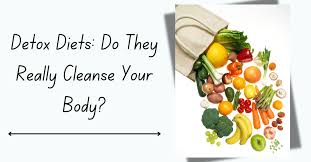The Truth About Detox Diets: Are They Worth the Hype?”
Detox diets promise quick results and a healthier body, but are they as effective as they claim? While some detox plans may help reset your habits, others lack scientific backing and could do more harm than good. Discover the truth behind detox diets and whether they’re truly worth the hype.

The Truth About Detox Diets: Are They Worth the Hype?"
Detox diets surge in popularity every January as New Year’s resolutions often focus on weight loss and health goals. These diets promise quick results by “cleansing” the body, but according to health experts, their benefits are largely exaggerated. While they may lead to short-term weight loss, detox diets are not sustainable or effective in the long run.
Moreover, they can cause issues such as nutrient deficiencies, fatigue, and digestive discomfort. The body naturally detoxifies through organs like the liver and kidneys, making extreme diet measures unnecessary. Instead, adopting a balanced diet, regular exercise, and proper hydration provides more sustainable and healthier results.
Detox diets, such as juice cleanses and extreme fasting, are often promoted as quick fixes for eliminating toxins from the body. However, Cheryl Robertson, a clinical dietitian with Mercy Health – Springfield’s Weight Management Program, emphasizes that the body already has a highly effective natural detoxification system. The liver and kidneys work tirelessly to cleanse and filter toxins, making such diets largely unnecessary.
While detox diets may provide short-term weight loss, they do not offer sustainable health benefits. In fact, they can sometimes lead to nutrient imbalances, dehydration, and other health concerns. Instead, maintaining a balanced diet and healthy lifestyle is a safer and more effective approach for long-term wellness.
The hospital recommends prioritizing healthier and sustainable lifestyle changes to support overall well-being and enhance the body’s natural detoxification processes.
Hydration is key, and drinking plenty of water helps flush out toxins effectively. A nutrient-dense diet rich in whole foods, including lean proteins, whole grains, fruits, and vegetables, is essential for optimal health. Regular exercise not only boosts metabolism but also aids the body’s natural detox mechanisms. Additionally, practicing mindful eating—paying attention to hunger cues and savoring meals—can prevent overeating and promote better digestion.
These long-term habits provide a more effective and balanced approach to wellness than quick-fix detox diets.
Does detox diet really work?
The effectiveness of detox diets is a topic of much debate. Here’s a breakdown of what’s known:
What Detox Diets Claim
Detox diets, such as juice cleanses, extreme fasting, or restrictive eating plans, are marketed as ways to remove toxins, promote weight loss, and improve health. They promise to “cleanse” the body of harmful substances, reset metabolism, and boost energy.
The Body’s Natural Detox System
Your body already has a highly efficient, natural detoxification system:
- Liver: Processes toxins and filters harmful substances from the blood.
- Kidneys: Eliminate waste products and excess substances through urine.
- Lungs, Skin, and Digestive System: Play supporting roles in expelling waste and maintaining balance.
These systems work continuously and don’t need external interventions to function effectively, provided you maintain a healthy lifestyle.
Short-Term Results vs. Long-Term Impact
- Short-Term Results: Detox diets can lead to temporary weight loss, mostly due to water loss, calorie restriction, and a lack of solid food. This is not sustainable and weight is often regained after the diet ends.
- Nutritional Deficiencies: Extreme detox diets can deprive your body of essential nutrients, leading to fatigue, muscle loss, or health issues.
- Misleading Benefits: Claims of toxin elimination are rarely scientifically backed, as most detox diets fail to specify what “toxins” they target or how the process works.
A Sustainable Approach
Instead of detox diets, focusing on long-term, sustainable habits—like eating whole foods, staying hydrated, exercising, and managing stress—is a healthier and more effective way to support the body’s natural detoxification processes and maintain overall well-being.
In summary, detox diets may work in the short term for superficial results, but they lack scientific support for lasting health benefits and can sometimes cause harm. A balanced, healthy lifestyle is a better path to achieving long-term health and wellness.
What toxins does detox remove?
The term “toxins” in the context of detox diets is often vague and not well-defined. Most detox programs don’t specify which toxins they claim to eliminate or provide evidence for their claims. Here’s what you need to know:
What Are Toxins?
Toxins are substances that can harm the body, and they generally fall into two categories:
- Exogenous Toxins: These come from external sources, such as:
- Pollutants (e.g., smog, chemicals)
- Pesticides and herbicides
- Alcohol
- Drugs (including medications and recreational drugs)
- Food additives or preservatives
- Endogenous Toxins: These are by-products of normal metabolic processes, like:
- Urea and ammonia (waste from protein metabolism)
- Carbon dioxide (produced during respiration)
- Hormonal by-products
Does Detox Remove These Toxins?
The body already has natural detoxification systems (liver, kidneys, skin, lungs, and digestive system) to handle these substances. Here’s how:
- Liver: Converts harmful substances into less toxic forms or prepares them for elimination.
- Kidneys: Filter waste and toxins from the blood and excrete them through urine.
- Skin: Eliminates some toxins through sweat.
- Digestive System: Expels waste and undigested substances.
- Lungs: Remove toxins like carbon dioxide during exhalation.
Detox diets often claim to assist or “enhance” these processes, but scientific evidence supporting their ability to remove specific toxins is lacking.
Specific Examples of “Toxins” in Detox Diets
Some detox programs claim to target:
- Heavy metals (like lead or mercury)
- Synthetic chemicals (like BPA or phthalates)
- “Impurities” from processed foods or alcohol
However, there is no evidence that detox diets can effectively eliminate these substances beyond what your body already does naturally.
The Reality
Most “toxins” that detox diets claim to remove are not scientifically identified or measurable. Instead, a healthy diet and lifestyle, including whole foods, hydration, regular exercise, and minimizing exposure to harmful substances, support the body’s natural detoxification processes more effectively than trendy detox regimens.
Do detoxes make you lose weight?
Detoxes can lead to short-term weight loss, but this is often temporary and not sustainable. Here’s how detoxes might affect weight:
Why You May Lose Weight on a Detox
- Caloric Restriction: Most detox diets involve cutting out processed foods and consuming fewer calories, often in the form of juices or very low-calorie meals. This caloric deficit can lead to initial weight loss.
- Water Weight: Detoxes often cause rapid water loss due to reduced sodium intake and a focus on high-water-content foods or liquids, such as fruits, vegetables, and juices.
- Decreased Bloating: Cutting out processed foods and refined carbohydrates can reduce bloating, which may make you feel lighter.
- Glycogen Stores: When you drastically reduce calorie or carbohydrate intake, your body uses up glycogen stores in the liver and muscles, which leads to water weight loss.
Why Detox Weight Loss Isn’t Long-Term
- Muscle Loss: Extreme detox diets may cause your body to break down muscle for energy, especially if protein intake is inadequate.
- Metabolic Slowdown: Severe calorie restriction can slow down your metabolism, making it harder to maintain or lose weight once you return to normal eating.
- Regaining Lost Weight: Once you resume a regular diet, the water weight and glycogen stores are typically replenished, and the weight often returns.
Sustainable Weight Loss vs. Detox Diets
Sustainable weight loss focuses on:
- Balanced nutrition with whole, nutrient-dense foods
- Adequate protein to maintain muscle mass
- Regular exercise
- Long-term lifestyle changes rather than quick fixes
Detox diets may give the illusion of weight loss but are not a reliable or healthy method for long-term weight management. Instead, focus on sustainable practices to achieve and maintain a healthy weight.
Are detox diets worth it?
Detox diets are generally not worth it as a long-term health or weight-loss strategy. While they may promise quick results, such as weight loss, improved energy, or “cleansing” your body, the scientific evidence supporting these claims is limited. Here’s a breakdown:
The Body Naturally Detoxes Itself
- Organs Like the Liver and Kidneys: Your liver and kidneys are highly efficient at filtering and eliminating toxins from your body without the need for special diets, juices, or supplements.
- Other Natural Processes: Your lungs, skin, and digestive system also play a role in detoxification.
Short-Term Effects of Detox Diets
- Weight Loss: Most of the weight loss is water weight or muscle loss due to calorie restriction, not fat loss.
- Decreased Bloating: Removing processed foods or reducing sodium may temporarily reduce bloating.
- Psychological Reset: Some people feel a mental boost or sense of accomplishment after completing a detox, but this is not due to actual toxin removal.
Potential Risks of Detox Diets
- Nutrient Deficiencies: Many detox diets lack essential nutrients like protein, healthy fats, and certain vitamins.
- Energy Imbalance: Low-calorie plans can lead to fatigue, dizziness, and difficulty concentrating.
- Disrupted Metabolism: Extreme calorie restriction can slow metabolism and make future weight management more difficult.
- Dehydration: Some detoxes that include diuretics or excessive fluid consumption can cause dehydration or electrolyte imbalances.
Sustainable Alternatives
Instead of detox diets, focus on sustainable, evidence-based practices that support your body’s natural detoxification:
- Eat a balanced diet rich in fiber, fruits, vegetables, lean proteins, and whole grains.
- Stay hydrated with water.
- Avoid processed foods and excess sugar.
- Exercise regularly to support circulation and metabolism.
- Limit alcohol and avoid smoking.
Conclusion
Detox diets are not a miracle solution and often offer more hype than substance. They may provide temporary effects but are not necessary for long-term health. Instead, a balanced, healthy lifestyle is a more effective and sustainable way to support your body’s natural detoxification processes and overall well-being.
How long do detox diets last?
Detox diets can last anywhere from 1 day to several weeks, depending on the specific plan or regimen. Here are some common durations:
Typical Durations of Detox Diets
- 1-Day or 3-Day Detox:
- Often involve juice cleanses or limited food intake.
- Marketed as a quick reset for the body.
- Effects are mostly short-term and include water weight loss.
- 7-Day Detox:
- May include a restrictive diet of fruits, vegetables, herbal teas, and supplements.
- Promises to “cleanse” the system in a week, though evidence is lacking.
- 14-Day or 21-Day Detox:
- May involve more complex plans, including eliminating sugar, caffeine, alcohol, and processed foods.
- Focuses on building longer-term habits, though many plans are still unsustainable and overly restrictive.
- 30-Day Detox:
- Programs like Whole30 fall under this category, focusing on eliminating certain foods to “reset” dietary habits.
- While more comprehensive, these are not detoxes in the traditional sense but elimination diets that promote mindfulness about food.
What to Consider About Duration
- Shorter Detox Diets: Provide quick weight loss (usually water weight) but may lack nutrients and energy, leading to fatigue.
- Longer Detox Diets: Risk nutrient deficiencies and may be difficult to sustain. They also lack strong evidence for long-term benefits.
Sustainable Alternative
Instead of temporary detox diets, focus on long-term lifestyle changes that support natural detoxification. A balanced diet, regular exercise, proper hydration, and sleep can help maintain overall health without the risks or restrictions of detox diets.
Do Detox Diets and Cleanses Really Work?
The effectiveness of detox diets and cleanses is highly debated, with limited scientific evidence supporting their claims. Here’s an overview:
What Detox Diets and Cleanses Claim to Do
Detox diets and cleanses, such as juice cleanses or fasting protocols, are marketed as ways to:
- Remove toxins from the body.
- Improve energy levels.
- Support weight loss.
- Boost digestion and overall health.
The Body’s Natural Detox System
The human body already has highly efficient detoxification systems, including:
- Liver: Filters toxins and metabolizes waste.
- Kidneys: Remove waste through urine.
- Lungs: Expel carbon dioxide.
- Skin: Eliminates toxins through sweat.
No specific diet or cleanse can “speed up” these processes beyond what the body naturally does.
What Science Says
- Toxin Removal: There’s no scientific evidence proving that detox diets eliminate more toxins than the body’s natural systems. Most marketed “toxins” are undefined, making these claims vague.
- Weight Loss: Detox diets may lead to short-term weight loss, but this is typically due to water loss and reduced calorie intake—not fat loss.
- Health Benefits: While eating whole foods and avoiding processed items during a detox might improve digestion and energy temporarily, the benefits are tied to better eating habits, not detoxification itself.
Potential Risks of Detox Diets
- Nutrient Deficiencies: Extreme cleanses or restrictive diets may lack essential nutrients, leading to fatigue, dizziness, or muscle loss.
- Dehydration: Juice cleanses and fasting can cause electrolyte imbalances.
- Unsustainability: Detox diets often promote short-term fixes rather than long-term lifestyle changes.
A Sustainable Alternative
Instead of detox diets, focus on supporting your body’s natural detox systems:
- Eat a balanced diet with fruits, vegetables, whole grains, and lean proteins.
- Stay hydrated.
- Exercise regularly.
- Get adequate sleep.
Bottom Line
While detox diets and cleanses might offer temporary results, they are not necessary for good health. A balanced, nutrient-rich diet and healthy lifestyle are far more effective and sustainable for long-term wellness.
How to know if detox is working?
Knowing if a detox is “working” can be tricky since detox diets and cleanses are often marketed with vague or unsupported claims. However, if you’re considering a detox, you can look out for certain signs that might indicate your body is reacting, either positively or negatively.
Signs That a Detox Might Be Working (Short-Term Effects)
- Increased Energy Levels
- As you eliminate processed foods, sugar, and unhealthy fats, you might notice a boost in energy due to the consumption of more whole foods and nutrient-dense meals.
- Improved Digestion
- Increased fiber intake from fruits, vegetables, and whole grains can support digestion and promote regular bowel movements.
- Clearer Skin
- Drinking more water and consuming nutrient-rich foods can potentially help improve skin health. However, this effect can vary based on the individual.
- Mental Clarity
- Some people report feeling more focused or clear-headed as a result of reducing toxins and consuming more whole foods, especially if they’ve cut out processed foods or sugar.
- Temporary Weight Loss
- Initial weight loss may occur, mostly due to water loss and a reduction in bloating, especially if you’re cutting out sodium-heavy or high-calorie foods.
Signs That a Detox Might Not Be Working (Negative Effects)
- Fatigue or Feeling Drained
- If you feel tired or lethargic, it might be due to nutrient deficiencies, especially if your detox involves restricting calories or essential nutrients.
- Digestive Issues
- Some people experience bloating, constipation, or diarrhea when undergoing a cleanse, especially if it involves drastic dietary changes or drastic increases in fiber.
- Headaches
- Detoxing from caffeine or sugar can lead to withdrawal headaches, which can be a sign that the detox is causing temporary discomfort due to abrupt dietary changes.
- Irritability or Mood Swings
- A sudden change in diet, especially cutting out comfort foods, might lead to irritability or mood swings, signaling that the body is struggling with the new routine.
- Nutrient Deficiencies
- If the detox is overly restrictive, you may experience symptoms like dizziness, nausea, or weakness, which could indicate a lack of essential vitamins or minerals.
Long-Term Indicators (Post-Detox)
- Sustained Healthy Habits: A detox is more likely to “work” if it leads to sustainable changes in eating habits. If the detox helps you form healthier eating patterns that you continue post-detox, it may have a long-term positive effect on your health.
- Stable Weight: If the weight loss is maintained after the detox and you’re following a healthy, balanced diet, this could indicate that the detox had a positive impact on your weight management.
The Bottom Line
While short-term results like increased energy or clearer skin might signal that your detox is working, it’s essential to remember that true, sustainable health improvements come from maintaining a balanced lifestyle. Detox diets are not a quick fix, and long-term health benefits are best achieved through continuous, healthy eating habits rather than extreme, short-term cleanses. Always listen to your body, and if you experience negative symptoms, it’s essential to consult a healthcare professional.
What Is a Juice Cleanse—and Are They Healthy?
A juice cleanse typically involves consuming only fruit and vegetable juices for a specific period, often ranging from a few days to a week. The idea behind a juice cleanse is to “detoxify” the body by flooding it with nutrient-rich juices, while eliminating solid foods that may be seen as contributing to toxins. The cleanse is often marketed as a way to help with weight loss, increased energy, and improved digestion, among other potential benefits.
How Juice Cleanses Work
During a juice cleanse, individuals typically drink multiple servings of juice each day—usually 4 to 6—replacing solid food with liquid nourishment. These juices are typically made from fruits, vegetables, and sometimes nuts, seeds, or spices. Some cleanses may also include herbal teas, supplements, or water to promote hydration.
Are Juice Cleanses Healthy?
While juice cleanses can offer some benefits, they also come with several potential drawbacks. Here’s a closer look:
Potential Benefits
- Increased Nutrient Intake
- Juices from fruits and vegetables are rich in vitamins, minerals, and antioxidants, which can support overall health.
- Juice cleanses may provide a boost of vitamins like vitamin C and folate, and minerals such as potassium.
- Improved Hydration
- Juices are high in water content, helping to improve hydration, which is essential for overall well-being.
- Improved Digestion (Short-Term)
- Juices, especially those with fiber from fruits and vegetables, can assist in digestion and promote bowel regularity.
- Potential Short-Term Weight Loss
- Because juice cleanses are low in calories, they may lead to temporary weight loss. However, this weight loss is likely to be water weight or related to calorie restriction rather than fat loss.
Potential Drawbacks
- Low Protein and Fiber
- Many juice cleanses lack adequate protein and fiber, which are essential for maintaining muscle mass and keeping you feeling full. Without these macronutrients, individuals may feel fatigued, hungry, and may struggle to maintain the cleanse.
- Blood Sugar Spikes
- Fruit juices, especially when made primarily from fruits like oranges, apples, or grapes, are high in natural sugars. Consuming large amounts of juice can lead to spikes in blood sugar levels, which may not be suitable for individuals with diabetes or insulin resistance.
- Potential Nutrient Deficiencies
- While juices provide vitamins and minerals, they often lack essential nutrients like fats, protein, and certain vitamins like B12 and vitamin D. A prolonged cleanse can lead to nutrient imbalances and deficiencies.
- Short-Term Results
- Any weight lost during a juice cleanse is typically temporary and due to calorie restriction or water loss, not fat loss. Once solid foods are reintroduced, weight may be regained.
- Digestive Issues
- A sudden influx of concentrated nutrients and sugars without enough fiber or solid foods may cause digestive discomfort like bloating, diarrhea, or stomach cramps.
- Potential for Unhealthy Relationship with Food
- Juice cleanses may reinforce restrictive eating patterns or unhealthy behaviors around food, potentially leading to disordered eating habits or a cycle of extreme dieting.
Is a Juice Cleanse Right for You?
- Short-Term Boost: If you’re looking for a temporary reset, a juice cleanse might provide a short-term energy boost or a mental break from processed foods, but it shouldn’t be relied upon for long-term weight loss or health improvement.
- Consult a Professional: If you have any underlying health conditions, like diabetes, or if you’re pregnant or breastfeeding, it’s important to consult a healthcare professional before trying a juice cleanse.
A Better Approach:
Instead of opting for a restrictive juice cleanse, consider incorporating more fresh fruits and vegetables into a balanced, sustainable diet. A focus on whole, nutrient-dense foods and maintaining hydration is a far more effective and sustainable approach to improving health and achieving long-term weight loss goals.
In Conclusion: Juice cleanses can provide short-term benefits, such as increased nutrient intake and hydration, but they are not a long-term solution for health or weight loss. A more balanced and sustainable approach to eating will provide better results for overall health and well-being.






Winston here from Iowa. I’m always watching to see what newer sites are going up and I just wanted to see if you would like an extra hand with getting some targeted traffic, Create custom AI bots to answer questions from visitors on your site or walk them through a sales process/funnel – I could even make a persona of yourself or employee to field questions about your business. I create/edit videos/images/adcopy, create/revamp/update sites, remove negative listings, the list goes on. I’ll even shoulder 90% of the costs, dedicating my time and tools that I’ve created myself and bought over the years. I’ve been doing this for over 22 years, helped thousands of people and have loved every minute of it.
There’s virtually no cost on my end to do any of this for you except for my time starting at 99 a month. I don’t mean to impose; I was just curious if I could lend a hand.
Brief history, I’ve been working from home for a couple decades now and I love helping others. I’m married, have three girls and if I can provide for them by helping you and giving back by using the tools and knowledge I’ve built and learned over the years, I can’t think of a better win-win.
It amazes me that no one else is helping others quite like I do and I’d love to show you how I can help out. So, if you need any extra help in any way, please let me know either way as I value your time and don’t want to pester you.
PS – If I didn’t mention something you might need help with just ask, I only mentioned a handful of things to keep this brief 🙂
All the best,
Winston
Cell – 1-319-435-1790
My Site (w/Live Chat) – https://cutt.ly/bec4xzTQ